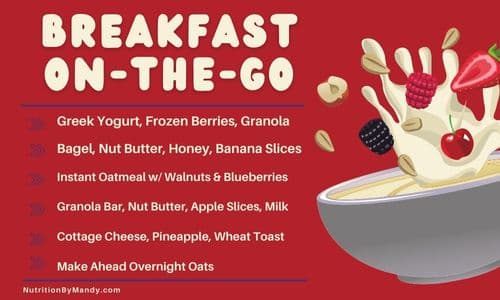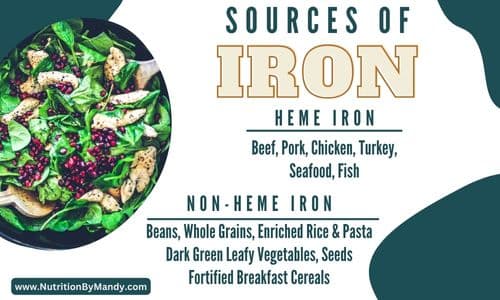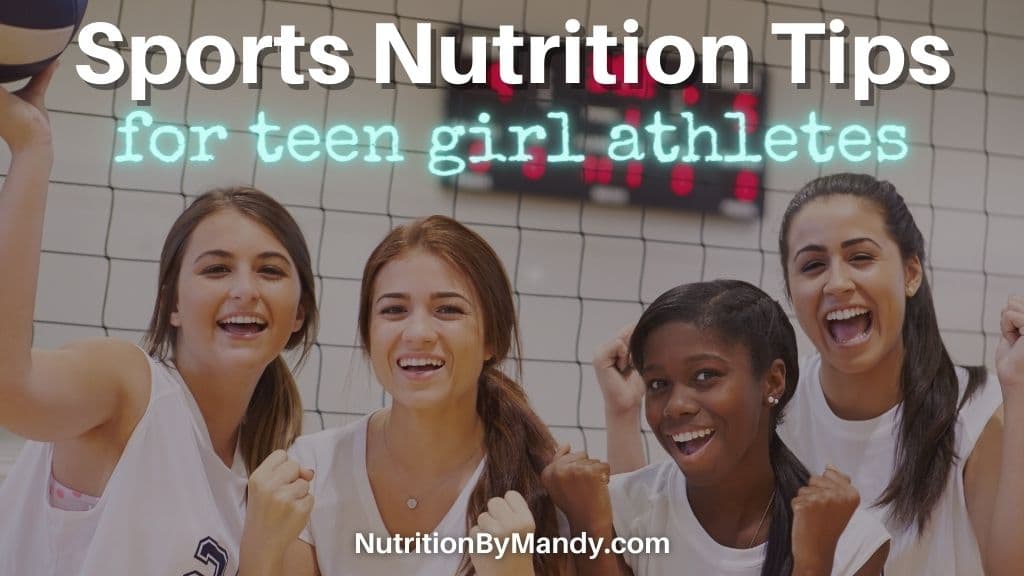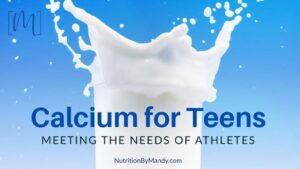Last Updated on April 5, 2025 by Mandy Tyler, M.Ed., RD, CSSD, LD
10 Sports Nutrition Tips for Teen Girl Athletes
*This article includes affiliate links. As an Amazon Associate, I earn from qualifying purchases.
It can be helpful for teen girl athletes to have a sports nutrition plan in place to support their health and performance goals.
Here are 10 tips to help meet the nutrition needs of teen girl athletes.
#1 Fuel Your Body for Health and Performance
My first priority for teen girl athletes is to ensure they are consuming adequate calories to support their daily energy needs.
Teen athletes often expend a high number of calories each day through practices and competitions, strength training and conditioning, as well as normal daily activities.
When daily caloric expenditure from these activities exceeds the dietary intake of calories from foods and beverages an imbalance occurs. We refer to this imbalance of calories as Relative Energy Deficiency in Sport or REDs (1).
REDs is associated with a syndrome of health concerns that can have negative impacts throughout the body. In addition, the caloric imbalance can also negatively impact sports performance.

Signs and Symptoms of Underfueling in Teen Girl Athletes
Signs and symptoms that a teen girl athlete may be underfueling include (1, 2, 3):
- Chronic fatigue
- Overuse injuries
- Stress fractures
- Frequent illnesses
- Constipation
- Disruption of the menstrual cycle
- Decreased heart rate and body temperature
- Difficulty concentrating
- Sleep disturbances
- Irritability, depression, mood swings
- Decreased response to training
- Reduced strength and endurance
Thus, it is important for female teen athletes to be aware of the impact that underfueling can have on both their health and performance.
#2 Focus on Carbohydrates for Energy
Carbohydrates provide athletes with the energy needed to train and perform at their best. Thus, they should be at the foundation of a teen girl athlete’s meal plan.
An athlete’s carbohydrate needs will vary based upon both the intensity and duration of activity the athlete is engaged in (4).
On days when the athlete will be exercising more intensely or for a longer duration, she should increase the amount of carbohydrates in her meal plan.
Adding Carbohydrates to a Teen Girl Athlete’s Meal Plan
There are a variety of ways that teen girl athletes can add carbohydrates to their diets, including:
- Grains: Bread, pasta, rice, oatmeal, cereal
- Fruit: Fresh, frozen, dried, canned in natural juices
- Starchy vegetables: Potatoes, sweet potatoes, winter squash, corn, peas, beans, and legumes
- Dairy: Milk and yogurt
In addition to providing energy, whole grain carbohydrates, fruits, vegetables, beans, and legumes also contain fiber. Fiber is an important part of a well-balanced diet and is associated with many health benefits.

#3 Consume Adequate Protein throughout the Day
Protein is important in the diet of teen girl athletes. It has many important roles in the body, including supporting athletes with building and maintaining muscle mass.
To get the most benefit from protein intake, teen girl athletes should aim to spread their protein intake throughout the day with several meals and snacks (5).
Unfortunately, I find many teen girls do well with protein intake at lunch and dinner, but tend to consume little protein with breakfast.
Thus, helping teen girl athletes find easy ways to add lean sources of protein to their meals and snacks throughout the day can be of benefit.
How Much Protein Should a Teen Girl Athlete Consume?
Protein recommendations for athletes are typically based upon body weight. Teen athletes should aim to consume ~0.3 g of protein per kg of body weight at each of several meals and snacks throughout the day (6, 7, 8).
This calculates to be in the range of 15-25 grams of protein at each eating occasion for most teen athletes; with larger athletes needing more protein than smaller athletes.
Athletes should also plan to include protein in their post-workout meal to support their recovery nutrition needs.
If the protein is spread over three meals and two snacks (5 eating occasions), the teen athlete’s daily protein intake would be in the range of 1.5 g/kg/day (7).

Adding Protein to a Teen Girl Athlete’s Meals and Snacks
There are numerous ways teen girl athletes can add protein to their meal plan, including:
- Eggs
- Chicken, turkey, pork, lean cuts of red meat
- Seafood, fish
- Low-fat milk, high-protein milk
- Greek yogurt
- Cottage cheese, string cheese, cheese sticks, sliced cheese
- Lean deli meat: Turkey, ham, chicken, roast beef
Plant-Based Sources of Protein
If a teen girl athlete is following a vegetarian or vegan diet, there are numerous ways they can meet their protein needs from plant-based sources.
The teen athletes should aim to include a variety of plant-based protein sources in their meals and snacks. This will help to ensure that adequate quantities of all of the essential amino acids are included in the athlete’s meal plan (9).
Here are ideas for plant-based sources of protein that teen girl athletes can include in their diet.
- Soy products: Soy milk, tofu, tempeh, edamame
- Beans, legumes, lentils
- Nuts, nut butters
- Seeds, seed butters
- Quinoa, buckwheat
- Hummus, chickpeas
- Seitan
#4 Make Breakfast a Priority
Starting the day with breakfast is important for teen girl athletes. However, I find it is a meal often skipped in the rush to get out the door.
Regularly eating breakfast is associated with improved cognitive function, memory, grades, and school attendance (10).
In addition, consuming breakfast is important for providing teen girls with the energy needed for the activities of the upcoming day.
Equipping teen girl athletes with breakfast-on-the-go ideas can be a convenient way to help them start the day with a nutritious meal.
Here are a variety of healthy breakfast on-the-go ideas to share:
- Protein overnight oats
- Whole grain bagel, peanut butter, banana, low-fat milk
- Greek yogurt parfait made with frozen berries and granola
- Cottage cheese with pineapple, breakfast bars
- Hardboiled-eggs, fig bars, fresh fruit
- Instant oatmeal with walnuts and blueberries
- Healthy fruit smoothie
- English muffin with egg, ham, and cheese, apple slices, low-fat milk

What Should a Teen Girl Athlete Eat Before a Morning Practice?
If athletes have morning practice before school, I encourage them to hydrate and to fuel their workout with a quick high-carb snack.
Ideas include:
- Banana or small piece of fruit
- Applesauce squeeze, dried fruit
- Fig bar, low-fat granola bar, breakfast bar
- Mini bagel, dry breakfast cereal
- Instant oatmeal, toaster waffle, low-fat muffin
- Graham crackers, animal crackers
Following morning practice, teen girl athletes should make it a priority to eat breakfast before starting the school day.
If available, they can grab a chocolate milk and quick meal from the school cafeteria. Another option is to pack one of the grab-and-go breakfasts listed above to enjoy before class.
#5 Healthy Snacks for Teenage Girl Athletes
Including healthy snacks in the diet can be an ideal way to help teen girl athletes meet their daily nutrition needs.
Teen girls should plan ahead and meal prep snacks they can enjoy throughout the week. When planning balanced snacks, athletes should aim to combine a carbohydrate-rich food item with a source of lean protein.
Here are several easy snacks that teen girl athletes can enjoy:
- Greek yogurt with fresh berries and granola
- Granola bars with nut butter
- String cheese with whole grain crackers
- Peanut butter and jelly on honey wheat bread
- Hummus with pita chips
- Apple slices with almonds
- Trail mix made with pretzels, whole grain cereal, dried fruits, and nuts
#6 Supporting Bone Health for Teen Girl Athletes
It is important for teen girl athletes to make bone health a priority. The majority of peak bone mass is accumulated by the age of 18. Thus, it is critical for athletes to focus on nutrition strategies to promote bone health in their teen years (11).
Low energy availability, such as discussed above with REDs, can have a determinantal impact on bone health (3). Thus, the first priority in supporting optimal bone health is consuming sufficient calories to support daily energy needs.
In addition to total caloric intake, including adequate calcium and Vitamin D in the diet is also important for supporting bone health in teen girl athletes.

Calcium for Teen Girl Athletes
Calcium is an important mineral that is necessary for optimal bone health. It provides the structural component for building strong bones (12).
Calcium can be obtained in the diet from a variety of sources, including:
- Milk, yogurt, cheese, cottage cheese
- Calcium-fortified orange juice and plant-based milks
- Calcium-fortified breakfast cereals and other foods
- Kale, Chinese cabbage, broccoli
- Tofu, soybeans
- Sardines
The recommended dietary allowance of calcium for teens age 13-18 is 1,300 mg/day (12). Teen girl athletes should aim to consume several servings of calcium-rich foods each day to meet their calcium needs (13).
If you are concerned that your teenager is not consuming adequate calcium in their diet, visit with a sports dietitian nutritionist. The dietitian can provide recommendations for increasing calcium intake and provide guidance on supplementation if needed.
Vitamin D for Teen Girl Athletes
In addition to calcium, Vitamin D is necessary for optimal bone health. Vitamin D has many roles, including promoting the absorption of calcium in the body (14).
Vitamin D is a fat-soluble vitamin the body can naturally produce when the skin is exposed to UV sunlight. It also can be obtained from food in the diet, including (13, 14):
- Milk fortified with Vitamin D
- Eggs (particularly the yolk)
- Fortified breakfast cereals
- Fortified plant-based milks
- Cod liver oil, trout, salmon
- Mushrooms exposed to UV light
The RDA for Vitamin D for teens age 13-18 years is 600 IU (15 mcg) per day (14).
Given the important role Vitamin D plays with bone health, athletes should consider visiting with their physician to have their Vitamin D level assessed. If deficient in Vitamin D, an appropriate plan for supplementation can be determined.
#7 Iron for Teen Girl Athletes
Iron is another nutrient that is important in the diet of teen girl athletes. It has many essential roles in the body.
Iron is necessary for growth, cognitive function, the formation of connective tissue, and maintaining a healthy immune system. It is also required for the formation of hemoglobin, which transports oxygen throughout the body and to working muscles during exercise (15).
When an athlete’s iron stores become low, iron-deficiency anemia can result. Iron-deficiency anemia can impact an athlete’s health and sports performance (13).
Symptoms of iron-deficiency anemia may include (15):
- Fatigue
- Weakness
- Headaches
- GI Distress
- Difficulty concentrating
- Compromised immune function
- Impaired athletic performance
Iron Needs of Teen Girl Athletes
It is particularly important for teen girls who have started their menstrual cycle to be mindful of their iron intake.
Iron needs are increased in female athletes to compensate for the loss of iron in blood during their monthly menstrual cycle (13).
The recommended dietary allowance of iron for teen girls is as follows (15):
- Girls, age 9-13 years: 8 mg/day of iron
- Girls, age 14-18 years: 15 mg/day of iron
If there is concern that a teen girl athlete may be iron-deficient, the athlete should have their iron levels tested. If deficient, the physician or sports dietitian nutritionist can provide guidance on increasing dietary iron intake as well as supplementation.
Note: Athletes should not start high-dose iron supplements without the guidance of a health-care professional. Consuming high doses of iron can interfere with the absorption of other nutrients, such as zinc (15).

#8 Disordered Eating in Teen Girl Athletes
It is important for parents, coaches, and athletic trainers to have an understanding of disordered eating and the negative impacts it can have on a teen girl’s health and well-being.
Research has found that disordered eating patterns and eating disorders are more common in athletes than non-athletes (16).
Given the higher prevalence of disordered eating patterns in the athletic population there is a need for increased awareness, screening, and early interventions for disordered eating in athletes (17, 18).
Warning Signs of Disordered Eating in Teen Girl Athletes
Signs and symptoms of disordered eating may include (19, 20, 21):
- Elimination of specific foods or entire food groups from the diet
- Rigidly following specific food rules and rituals
- Preoccupation with body weight or intense fear of gaining weight
- Athletes expressing feeling fat or disliking their body shape or figure
- Wearing baggy clothes or dressing in layers
- Excessive exercise to burn calories – even when injured or the weather is bad
- Feelings of guilt for eating “unhealthy” foods or excess calories
- Eating unusually large amounts of food within a short time (binge)
- Going to the bathroom immediately after eating
- Worn tooth enamel, chronic sore throat, swollen salivary glands (related to purging)
- Avoidance of team events involving food
- Social isolation
It is necessary to recognize that disordered eating behaviors exist on a continuum ranging from occasional unhealthy eating and exercise behaviors to clinically diagnosed eating disorders, such as anorexia or bulimia (22).
Teen girl athletes anywhere along the continuum that are displaying disordered eating behaviors can benefit from meeting with a sports dietitian nutritionist.
A sports dietitian is a key part of the treatment team, working alongside a physician and mental health professional, to address the teen’s specific health and nutrition concerns.

#9 Skip the Energy Drinks
The consumption of energy drinks is a topic I frequently discuss with teen girl athletes. I have found it to become increasingly common for teen girls at the high school and collegiate level to consume energy drinks prior to a workout or in the evening when studying.
Let’s take a look at what energy drinks are and why I recommend teen athletes avoid them.
What Are Energy Drinks?
Energy drinks are beverages that are often marketed to athletes, teens, and young adults as a means to help improve performance, reduce fatigue, enhance concentration and focus, and increase energy levels (23, 24, 25).
The main stimulant contained within energy drinks is caffeine. In addition to caffeine, energy drinks often include a variety of other ingredients such as: taurine, ginseng, green tea extract, guarana seed, chromium, carnitine, B Vitamins, and herbal extracts (23, 24, 25).
The combination of ingredients in the drink may have a synergistic effect in the body and lead to health concerns (23).
Concerns with Energy Drinks for Teen Girl Athletes
Adverse health effects that have been associated with the consumption of energy drinks include (23, 24, 26):
- Jitteriness, anxiety
- Increased heart rate and blood pressure
- Abnormal heart rhythms
- GI issues
- Disrupted sleep
For these reasons, I recommend teen athletes avoid the consumption of energy drinks. If teens feel they are lacking energy, they should try eating a carbohydrate-rich snack, such as a granola bar, pretzels, or piece of fresh fruit.
#10 Get Enough Sleep
Getting adequate sleep is important for teen athletes. Sleep is essential for optimal physical and mental health in teenagers, as well as for sports performance.
Despite the importance of sleep, the majority of high school students do not get adequate sleep each night (27).
The American Academy of Sleep Medicine recommends teenagers get 8-10 hours of sleep each night to promote optimal health (28).
Below are tips to help teen girls develop positive sleep habits to promote getting a good night’s rest (29).
- Focus on creating a consistent sleep schedule, going to bed and getting up at the same time each day (including on the weekends).
- Develop a relaxing sleep routine to use before bed, such as reading, journaling, deep breathing, or mindfulness exercises.
- Set-up an ideal sleep environment by making the bedroom cool, dark, and quiet (like a cave).
- Limit the use of electronics in the hour before going to bed.
- Consider the use of blue light blocking glasses (available on Amazon) when completing homework on a computer or tablet prior to bed.
It is important for athletes to remember that getting adequate sleep is a critical part of their overall sports performance game plan.
10 Sports Nutrition Tips for Teen Girl Athletes
You are now set with 10 sports nutrition tips to support teen girl athletes with achieving optimal health and sports performance.
For additional sports nutrition recommendations for teenagers, check out my blog on the importance of hydration for athletes.
Join the Nutrition By Mandy Email List & Get a Free Athlete’s Grocery List
Click HERE to join the Nutrition By Mandy e-mail list. When you join you will receive a free athlete’s grocery list to print and take with you to the store.
About the Author
Mandy Tyler is a Sports Dietitian Nutritionist in the San Antonio, TX area. She is a Registered and Licensed Dietitian, a Board-Certified Specialist in Sports Dietetics, a Licensed Athletic Trainer, and is a Certified Exercise Physiologist through the American College of Sports Medicine. Mandy has experience working with athletes at the high school, collegiate, and professional levels. She believes the key to reaching one’s full potential, both in everyday life and in sports performance, relies on a healthy nutritional foundation.

If you are looking to take your performance to the next level, make sure to check out my new Sports Nutrition Game Day Guide. This downloadable guide is written to help athletes develop an individualized plan to achieve peak performance on game day.





